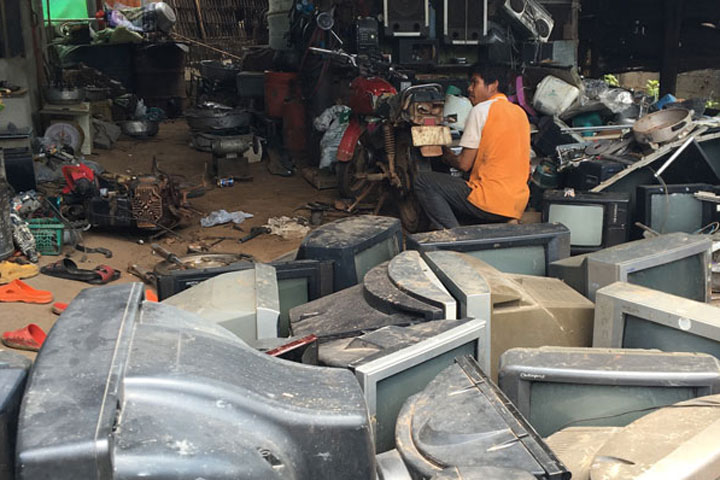
E-waste—electronic waste, or discarded household or business products that contain circuitry or electrical components—is a global and growing threat to human and ecosystem health.
Low-income countries bear a disproportionate burden of the impacts of e-waste, as higher-income countries often export waste to be recycled or disposed of in these less expensive settings.
The recycling creates much-needed employment opportunities, but the informal recycling and disposal approaches currently used in these resource-constrained settings recover only a fraction of potentially recyclable materials while exposing workers and communities to hazardous agents.
| See: Improving Working Conditions for E-Waste Recyclers (Global Michigan) | Collaborating to Solve the Global E-Waste Challenge (Graham News) | April 2018 Changing the Global E-Waste Cycle Event (Videos & Presentations) |
Building a Team
Dr. Rick Neitzel at the University of Michigan School of Public Health first came to know about the e-waste problem while working on another research project in Ghana. While visiting the country, his Ghanaian colleagues took him to Agbogbloshie, an e-waste dump site in Accra, Ghana’s capital city. “From just a 30-minute glimpse of the site I realized this was a huge problem,” says Neitzel. "The issues there—environmental pollution, health endangerment, and economic hardships and opportunities—needed to be engaged with through multiple disciplines and multiple socio-cultural lenses.”
In the 4 years since conducting initial studies in Ghana, and with support from the Graham Sustainability Institute and others, Neitzel has built a collaborative team spanning multiple disciplines, countries, and sectors for a research-to-practice project that seeks to identify comprehensive solutions to address the challenging and complex issues surrounding e-waste recycling.
Assessing E-waste in Thailand and Chile
The team’s current work is focused in Thailand and Chile. In both countries, U-M researchers and students have been working with colleagues from local universities, public health agencies, and community organizations to collect and analyze a wide variety of data. They have completed comprehensive assessments of exposures among e-waste workers performing recycling, dismantling, and repair on discarded electronics in a variety of settings. They are also completing economic and life cycle evaluations, comparative analyses of e-waste policies, and focus groups to understand e-waste worker perceptions.
Click to Expand Slideshow and Captions
Collaboratively Identifying Solutions
In April 2018, the team convened project collaborators and other experts for a three-day multidisciplinary, international event at the University of Michigan campus. Experts from academia, NGOs, government, and business groups discussed their work during an all-day public event Changing the Global E-Waste Cycle and spent the following two days in facilitated working sessions to identify next steps and recommendations, including pilot tests that are currently underway.
Together, the analyses, recommendations, pilot tests, and new partnerships will provide actionable information and resources for informal e-waste recycling workers and their communities in Thailand and Chile, as well as government agencies and NGOs in Thailand and Chile, and international organizations.
News & Resources
- Changing the Global E-waste Cycle April 2018 event - Presentations and videos from this all-day public event in Ann Arbor, Michigan in April 2018
- Improving Working Conditions for E-Waste Recyclers - Global Michigan feature story
- Collaborating to Solve the Global E-Waste Challenge - Article on the collaborative approach and outcomes from the project
- Expert Workshop on Changing Global E-waste Cycle Brings Together Leaders from Around the World - School of Public Health news release on the event workshop
- Using Innovative Facilitation to Enhance Research Impact - Article on the integrative design based methods used at the April 2018 event workshop
- Visit the team's project webpage
Team Members
The team includes collaborators from universities, community and non-governmental organizations, and government. In addition to those listed below, numerous students from all three countries have been involved in the work.